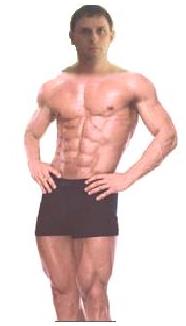Visualize the Body You Desire
 Monday, January 17, 2011 at 06:17PM
Monday, January 17, 2011 at 06:17PM While I do not consider myself a student of metaphysics, I do think there is a lot to be said about the power of positive thinking and visualizing a desired outcome. Many years ago I read a research study on the power of visualization in which 3 groups of people were tested on their ability to shoot basketball freethrows. At the beginning of the study they shot freethrows to establish a baseline performance level. After establishing a baseline, the different groups were given different sets of instructions.
Group one was the control group. They didn't have to do anything differently. They just went about their normal lives. The second group was asked to practice for a certain time period or number of shots every day. The third group was asked to imagine successfully shooting freethrows for a certain length of time each day but they were not to actually shoot freethrows.
After 30 days, the groups were again evaluated on their freethrow shooting ability. Group 1, the control group, showed no change in their ability to shoot freethrows. Group 2, the group that practiced freethrows consistently showed a 24% improvement in their performance. Most remarkable, however, was Group 3, the visualization group. Although this group hadn't touched a basketball during the entire experiment period, their freethrow shooting ability increased by 23%.
Whenever we visualize something, our brains begin active recruitment of body systems to carry out the task being visualized. If you want to shoot more freethrows, practice AND visualize. If you want to throw more strikes in bowling, hit better tee shots in golf, or blast more home runs in church league softball, visualize your goal and the path leading to it and see if performance improves.
The process of transforming your physique isn't immune to the effects of visualization. Here are a couple of ideas on how to visualize the body you want.
Meditate
Sit or lay in a quiet, comfortable place. Darkness helps. Close your eyes and visualize your perfect physique. Make sure every body part is accounted for - arms, shoulders, chest, abs, waist, back, thighs, and calves. Imagine them as being lean, muscular, and rippling. Imagine yourself running and not being tired. Imagine that you are lifting weights you never imagined and your muscles are responding to the activity exactly as they are supposed to.
Further, visualize the inside of your body - the heart, circulatory system, and lungs. Imagine a perfectly clean circulatory system - no clots, plaque, or other harmful deposits in your veins or arteries. Imagine your lungs as clear and able to take in as much life-giving oxygen as possible with every breath. Visualize every cell in your body working as it was designed to work.
These visualizations don't need to take a long time - 10 minutes or so should suffice - and can actually be done when lying in bed before sleep. If you fall asleep while visualizing these things, all the better since they will be the last thing your conscious mind contemplates just before entering subconscious patterns.
Conscious Visualization
 I'm not exactly sure what to call this practice, so I'll just call it conscious visualization. Back in 2008 when I was working on getting out of the rut my life had fallen into, I was working in a position that had me sitting all alone in a building (a double-wide "office") monitoring a database. The job afforded me a few nice perks, one of which was a dual-monitor computer setup and a laptop. When I wasn't tied to using both monitors, I would leave the picture you see to the right on the second screen. If I was using both monitors, I would pull the image up on my laptop. I always had the image in front of me.
I'm not exactly sure what to call this practice, so I'll just call it conscious visualization. Back in 2008 when I was working on getting out of the rut my life had fallen into, I was working in a position that had me sitting all alone in a building (a double-wide "office") monitoring a database. The job afforded me a few nice perks, one of which was a dual-monitor computer setup and a laptop. When I wasn't tied to using both monitors, I would leave the picture you see to the right on the second screen. If I was using both monitors, I would pull the image up on my laptop. I always had the image in front of me.
The body in that image belongs to Jamie Brunner. The head was from one of my before shots.
The color was bad, and the image looked a little funny, but what I was trying to do was visualize myself with that body. I got the idea from a Body-for-LIFE video that I got back in 2000 in which Hank Johnson used the technique to create an INCREDIBLE transformation of his physique.
All you need to do is find a picture of the body you want to walk around in, superimpose your head onto that body, and save the image. You can print it and put it on your fridge (the trouble spot for many a would-be physique transformer) or put it on your bathroom mirror as a reminder that yours is a body under construction and the picture represents the goal.
Hopefully all of this makes sense and doesn't sound to woo-woo for anyone out there. There is a lot to be said about the power of the mind over the body. Tap-in to this potential gold mine and put it to work in your favor.
![]() Like this article?
Like this article?
Buy us a Fat-Free Latte!
 Keith |
Keith |  Post a Comment |
Post a Comment |  Fat Loss,
Fat Loss,  meditation,
meditation,  visualization,
visualization,  weight loss in
weight loss in  Lifestyle,
Lifestyle,  Motivation,
Motivation,  Psychology
Psychology 



